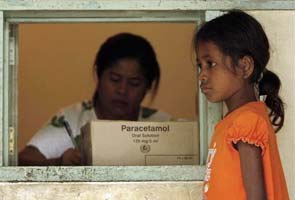
The vaccine, known as MVA85A, is the most advanced of more than a dozen TB vaccines now in clinical trials in people, and scientists are poring over the results to learn why the trial failed and how the results can inform future studies.
MVA85A was developed by researchers at the University of Oxford in Britain with support from Aeras, the Wellcome Trust, the European Commission and the Oxford-Emergent Tuberculosis Consortium, a joint venture between Oxford and Emergent Biosolutions Inc.
The current TB vaccine, known as Bacille Calmette-Guerin, or BCG, was developed in 1921, and is given routinely to babies in countries with high rates of TB to prevent severe disease.
However, protection wears off in just a few years, and BCG does nothing to protect against the most common form of tuberculosis that invades the lungs of adults and adolescents, and can be transmitted through coughing and sneezing.
For the study in the British medical journal, the Lancet, researchers tested the vaccine in nearly 3,000 healthy babies in South Africa who had already been given the BCG vaccine. Half also got the new vaccine and half served as the placebo group.
After a follow-up period of about two years, 32 babies in the MVA85A group got TB compared with 39 in the placebo group, a modest, but statistically insignificant improvement.
Researchers said the protection seen in the infants was much lower than had been seen in adults who had tested the vaccine, and they plan to look more closely to understand why. They did not provide figures on how well it worked for adults.
Despite the result, the study represents a landmark.
"This is the first efficacy trial of a new TB vaccine since Bacille Calmette-Guérin, a significant step in itself, and there is much that we and others can learn from the study and the data it produced," Helen McShane from the University of Oxford, who developed the vaccine, said in a statement.
With many other infectious diseases, scientists can rely on animal models and protective markers in the blood known as correlates of protection to predict whether a vaccine will work in people. This is not that case with TB, an ancient disease that hides out in the cells of their human hosts.
As a result, TB vaccines must be tested in large clinical trials in people, a large and costly gamble.
Christopher Dye of the World Health Organization and Paul Fine of the London School of Hygiene and Tropical Medicine, said in a commentary published with the study that the trial offered some of the first hard evidence about protection against TB in people.
"If the history of TB vaccine research teaches us anything, it is to expect surprises. We need to keep playing this high-stakes game," they wrote.
Aeras remains committed. It is backing six TB vaccine candidates, including two others in large-scale trials -- one by Johnson & Johnson's Crucell vaccines unit and one by GlaxoSmithKline.
Ginsberg said it would be "a huge mistake for the world to get discouraged by this and give up." She said TB was "far too urgent a problem" and the current tools "far too inadequate" to address the global TB epidemic, which infects 9 million people annually and kills 1.4 million.
"The one thing that could change the game on the TB epidemic is to have safe, affordable and effective vaccines," she said.
"We absolutely cannot afford to slow down at all."
No comments:
Post a Comment